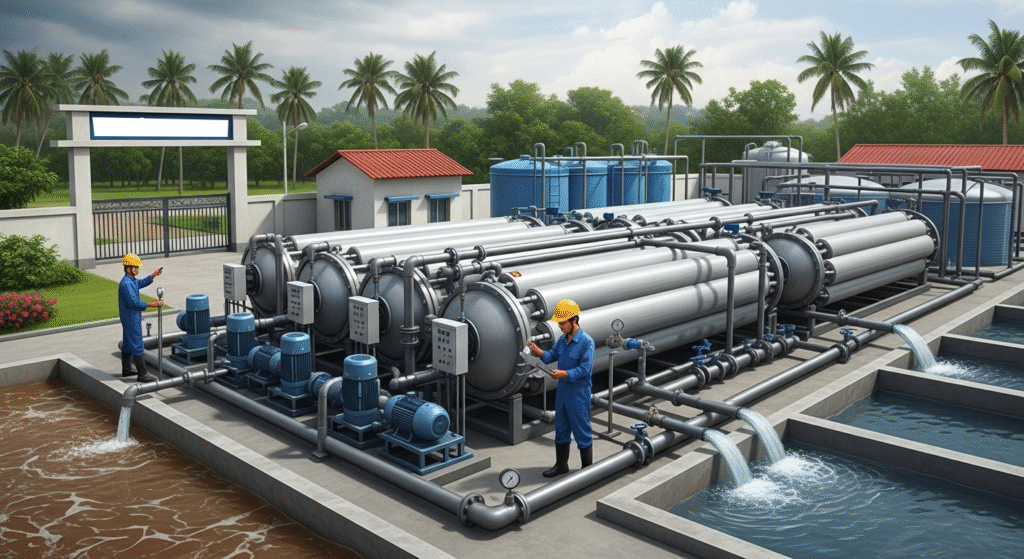
Effluent Treatment Plant is a process which is designed as to treat industrial wastewater. To remove impurity from water there is a process which is called ETP Plant. Greenify is Best ETP Supplier in Bangladesh.
An effluent treatment plant is a process to remove impurity from industrial wastewater. As a human being we have some responsibility to protect our environment. Here mentioning some of reason that case we need etp plant, which is given below:
*Environmental Protection: To protect pollution of natural water, groundwater by removing toxic chemicals, heavy metals, organic matter, suspended solids, oils, greases and pathogens.
*Resource Recovery: To recover valuable by products like treated water for non portable reuse, sludge for fertilizer and reduce freshwater consumption.
*Public Health: To protect human health by treating water & contamination of drinking water resources.
*Ecosystem Preservation: To safe aquatic life & biodiversity in receiving waters.
*Compliance: To meet Environmental regulations and standard set by government agencies for permissible levels of pollutants in discharge water.
There is Five steps of Treatment Process of Effluent Treatment Plant given below
*Preliminary Treatment: Removes large solid particles from wastewater by Screens or Grit Chamber.
*Primary Treatment: To remove settleable solid and floatable oil/greases. DAF system and Chemical Coagulation & Flocculation is usually used here.
*Secondary Treatment: Here used microorganism bacteria to break down dissolved and colloidal organic matter. There is Aerobic process like Moving Bed Biofilm Reactor (MBBR), Sequential Batch Reactors (SBR) Etc. And in Anaerobic process uses anaerobic digester to producing biogas to digest waste.
*Tertiary Treatment: Tertiary treatment include filtration systems like Sand Filtration, Activated Carbon Filtration, Micron Filter, Ultrafiltration, Reverse Osmosis & Disinfection Etc.
*Sludge Treatment: The solids remove from various stages are thickened dewatered by screw press machine and then dispose or reuse.
A combination of biological treatment (for organic pollutants) followed by physico-chemical polishing (for residuals and heavy metals) is often the most cost-effective and efficient approach for many industrial effluents. For specific cases, pilot testing and detailed cost analysis are recommended to determine the optimal methodology.
Greenify is one of the largest water & wastewater treatment solution provider company in Bangladesh. Only greenify has own facility to provide solution for both of water & wastewater. Below giving some reason to choose us:
Experience and Reputation: Greenify has well track record on this field, our expertise on this field about 08 years which is fare enough to prove our quality commitment to client. From the beginning of our business our all customer 100% satisfied. And in bangladesh market Greenify is a reputed brand to provide quality support when its required round the clock.
Technology and Equipment Quality: Greenify always updated with technology and we provide world class quality product which is imported by ourselves. So we can make sure the quality of each and every products.
Certifications and Compliance: Greenify is the first ISO9001:2015 Certified Company in Bangladesh. And we always follow our local government guidelines & international regulations as well which is published by EPA.
Range of Services: We have one stop solution for you like from the designing to implementation & monitoring we do by our own team. We don’t need to take any support from outside.
Customization and Flexibility: Based on water quality we’re ready to provide optimum solution. As per customer demand with any site condition our team ready to design for you.
Cost and Value: Greenify is well known in very short time of service period due to our cost effective solution for water treatment industry. we just don’t focus on cost, we also maintain premium quality as the customer gets long term service from our installed plant.
Customer Support and Service: Our team always ready to service to our client when it’s required round the clock. After handover a project we also provide training to our client as they can operate smoothly.
Environmental Impact: Greenify is always doing environment friendly practice and providing sustainable solutions.
References and Case Studies: Greenify has already stablished 25000+ water & watstewater treatment plants which is running smoothly. Only Greenify has this kind of field work experience for all of industry. Rural water treatment demand to Industrial Wastewater Treatment solution Greenify is one stop trusted solution.
Innovation and R&D: Greenify always thrusted to gather new innovative technology knowledge as we can provide optimum solution to our client. So we stablished our own facilitated workshop & laboratory to research & development about water & wastewater solution.
If you need ETP Plant Supplier then Greenify is the best solution provider for you in Bangladesh.
Contact us to establish/modify your etp plant without any hesitation. Call: 01771646625 (WhatsApp)